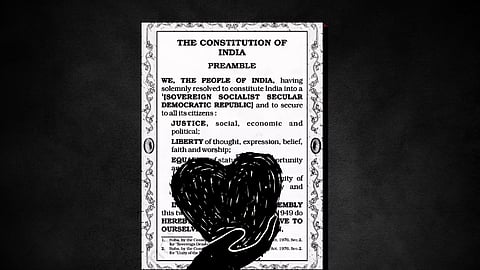

A group of eminent lawyers has urged the Chief Justice of India to direct the Central Bureau of Investigation to lodge a first information report against the Allahabad High Court judge Shekhar Kumar Yadav for a speech at a Vishwa Hindu Parishad event organised on the premises of the court.
During the speech, he used derogatory terms for Muslims, engaged in communal rhetoric and expressed his support for a majoritarian government in India.
At the root of his speech was the notion of ‘us versus them’, where Hindus were co-identifiable with India (Bharatiya samaj) while Muslims were outsiders whose values were incompatible with the values of the majority.
Meanwhile, Justice Yadav remains defiant, writing to the Chief Justice of the Allahabad High Court, saying he stands by his remarks and that they did not violate any principle of judicial conduct.
When politically nurtured Islamophobia unites large segments of the populace under a homogenised and uniformised religious identity; when the State foments and supports this Islamophobia through bullying and persecuting Muslims, how do those individuals or groups who are discomfited, disturbed and angered by it articulate their discomfort and dissent with the Islamophobic commonsense of the times?
The availability of media-constituted sites of public conversation and debate, seemingly open to anyone who wants to access that site for the expression of opinion, creates the illusion of a radical democracy of speech.
However, the legibility of speech within these sites of communication is structured and regimented through the invisibilised protocols of conversation that are generated through these sites. Through constant repetition, a grammar of free expression of opinion, dissent and the stating of truths is naturalised through these sites.
Given this, is it not the case that dissent has always already been made ineffectual, if not impossible, because it can never wrench apart or dismantle the grammar of a powerful, historically contingent, commonsense of truth?
Is it not true that dissent can only be articulated within the protocols of speaking and listening through conversations that are organised and arranged in time and space at a particular historical moment?
Dissent takes the shape of jokes that exaggerate common sense while seemingly creating the appearance of criticism. Dissent reiterates what it opposes by using commonly shared conventions and strategies of shrillness. Dissent is forced to be an oppositional reply generated through and on the grounds of that which it opposes.
Could dissent be shaped through a deviant repetition of commonsense? What is the location that initiates that deviance? Is such a location available at all? If there is such a location how can dissent be generated through and by that location, and simultaneously be legiblised without allowing itself to be appropriated by the commonsense of the times?
Taking recourse to the term ‘performative’ from the queer feminist Judith Butler, can dissent be articulated through a disruptive performative of media-generated protocols of speech?
In recent times, one of the most powerfully disruptive performatives of media-generated protocols of public speech has been the interview by Karan Thapar of senior advocate Dushyanth Dave, released on YouTube on November 30.
In this interview, both Dave and Thapar go astray of the Islamophobic commonsense of the times and the protocols of public speech through which this Islamophobia is naturalised as the normality and necessity of a strong nation-state.
Dave not only dismantles an Islamophobic idea and practice of nationalism as immoral and dangerous to the very existence of the nation-state but also, systematically unpacks the collusion of the judiciary at present with the Islamophobic excesses of the Bharatiya Janata Party (BJP) regime, especially, through its highest functionary the Chief Justice of India.
At the same time, he also unpacks the ways in which a more viable and ethical idea and ideal of the nation which accommodates and fosters the co-existence of a multireligious community of people has been discursively structured through the Constitution of India, and been made implementable through the institution of the judiciary.
The interview, by deliberately maintaining the gap between these two ideas and ideals of the nation, and by avowedly aligning itself with the latter, develops a critique of the Islamophobic nation and the common sense that normalises it.
At the end of the interview, Dave breaks down and starts to cry. He says, “I am worried about my country… You don’t know how much this is impacting me … and how much it must be affecting those belonging to the minority community… It is really sad what is happening… I can’t understand why no one in this country wants to stand up and fight this nonsense.”
At this point in the interview, Dave performatively displaces himself into the subject position of the persecuted Muslim. He ruptures the skin of the Islamophobic self of his viewers that marks the boundaries of their being and shapes them as subjects of an Islamophobic regime.
For a moment at least, they suffer the shock of being made misshapen and the discomfort of being pushed to renew themselves against the grain of their Islamophobic hatred.
The foundation of human co-existence is based on our capacity for radical empathy. Radical empathy enables and requires us to rupture the skin of the self, however its boundaries have been socially drawn and regulated, and be ready to be pushed into the outside of ourselves.
Being open to being so pushed out makes us vulnerable. It initiates a process fraught with the uncertainties of unknowing, a process that is open-ended. It is initiated by our human capacity to be touched and disrupted by the interlinkages and attachments of co-existence that link us with all that lives.
It initiates in us the need to build the social structures through which this co-existence can be realised and legibilised. At the close of this powerful interview, Dave provides us with a performative of human empathy that is generated and shaped through the disruption, the discomfort and the pain of radical empathy.